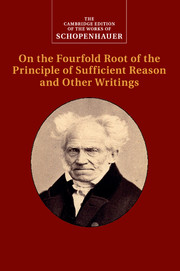Book contents
- Frontmatter
- Contents
- General Editor’s Preface
- Editorial Notes and References
- Introduction
- Notes on Text and Translation
- Chronology
- Bibliography
- Collation of the Two Editions of On the Fourfold Root
- 1 On the Fourfold Root of the Principle of Sufficient Reason
- 2 On Vision and Colours
- 3 On Will in Nature
- Glossary of Names
- Index
Eighth Chapter - General Remarks and Results
Published online by Cambridge University Press: 30 June 2022
- Frontmatter
- Contents
- General Editor’s Preface
- Editorial Notes and References
- Introduction
- Notes on Text and Translation
- Chronology
- Bibliography
- Collation of the Two Editions of On the Fourfold Root
- 1 On the Fourfold Root of the Principle of Sufficient Reason
- 2 On Vision and Colours
- 3 On Will in Nature
- Glossary of Names
- Index
Summary
THE SYSTEMATIC ORDER
The sequence in which I have presented the different forms of our principle is not a systematic presentation, but merely chosen for clarity, putting first that which is better known and that which at least presupposes the rest, according to Aristotle's rule ‘In learning, begin not with that which is first, and which is the beginning of the matter, but first learn that which is easiest’ Metaphysics iv, 1. But this is the systematic order which the classes of the grounds must follow. First the principle of the reason of being must be cited, and, here again, first in its application to time, the simple scheme of all the remaining forms of the principle of sufficient reason, containing only what is essential, the prototype of all finiteness. Then, after the statement of the ground of being in space, the law of causality must be stated; after this the law of motivation follows; and finally the principle of sufficient reason of knowing will be stated, since the others refer to immediate representations, but this last refers to representations of representations.
The truth expressed here, that time is the simple scheme, containing only what is essential to all forms of the principle of reason, explains the absolutely perfect clarity and accuracy of arithmetic, to which the clarity and accuracy of no other science can be compared. That is, all sciences are based on the principle of reason, since without exception they are connections of grounds and consequences. But now the series of numbers is the simple and sole series of the ground of being and consequence in time. Because of this perfect simplicity, since it excludes nothing, nor are there anywhere indeterminate relations, it leaves nothing to be desired in clarity, accuracy, and apodictic certainty. In these qualities, all other sciences are inferior, even geometry, because so many relations arise from the three dimensions of space that a survey of it becomes too difficult for pure intuition, as well as for empirical intuition. For this reason, complicated problems of geometry are solved only through calculation, and thus geometry quickly resolves into arithmetic. I need not show that the remaining sciences contain all sorts of obscure elements.
- Type
- Chapter
- Information
- Schopenhauer: On the Fourfold Root of the Principle of Sufficient Reason and Other Writings , pp. 143 - 152Publisher: Cambridge University PressPrint publication year: 2012

